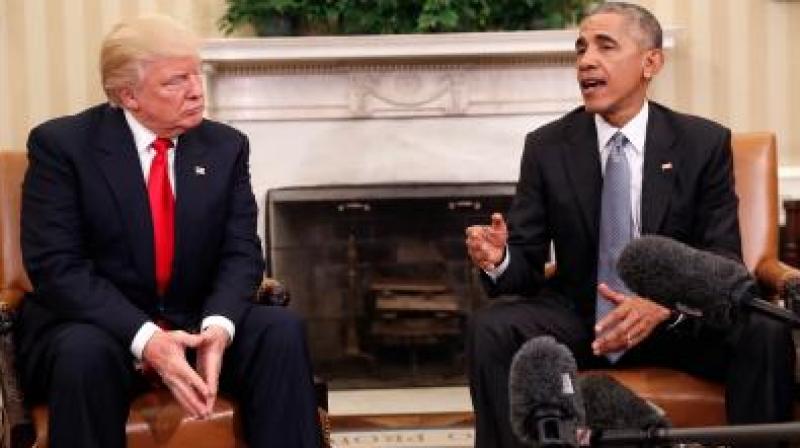US: 3 things Republicans were against when Obama was in-charge but are mum now

Washington: It was only a few months ago when Republicans routinely blasted the president for what they called his executive overreach and his failure to tout America's superiority over other nations. Not so much anymore.
Now that Barack Obama is out of the White House, Republicans have become noticeably quiet on a host of issues that used to spark their criticism.
In the last few days, President Donald Trump's actions have thrown the spotlight on three things Republicans don't seem to mind now that their fellow Republican is in charge.
Relying on executive action:
For years, Republicans skewered Obama for allegedly ruling by fiat, accusing him of acting like an "emperor" for using executive orders to push through his agenda. That was especially true when it came to Obama's decision to protect more than 700,000 young immigrants who were brought to the US as children from deportation.
But now that Trump is in the White House, their tune has changed.
Trump has spent his first weeks in office relying on executive action to make good on a long list of campaign promises. Most controversial was his order suspending the country's refugee program and blocking immigration from seven majority-Muslim countries, which is now held up in court.
Asked recently if President Trump was doing the same thing as Obama, House Speaker Paul Ryan scoffed.
"It's quite the opposite," he told reporters at a recent GOP retreat, arguing that Obama had exceeded his power and that Trump was merely trying to reverse it.
"He's restoring the proper balance," said Ryan. "And in our opinion, he is undoing a lot of damage that was done by the last president, who exceeded his power."
Failing to embrace American exceptionalism:
It was a running theme during Obama's tenure: The president, Republicans would argue, failed to embrace a brand of "American exceptionalism" that sees the US as morally superior to other nations.
"We have a president right now who thinks America's just another nation," once-GOP presidential candidate Mitt Romney said during a 2011 primary debate. "America is an exceptional nation."
Obama defended himself, saying in 2014 that he believed "in American exceptionalism with every fibre of my being."
However, Trump doesn't seem worried about the criticism.
In an interview with Fox News Channel's Bill O'Reilly that aired over the weekend, Trump dismissed concerns about befriending Russian President Vladimir Putin.
"But he's a killer, though. Putin's a killer," O'Reilly said.
"We've got a lot of killers," Trump responded. "Boy, you think our country's so innocent?"
Pressed on the exchange in an interview with CBS' "Face the Nation," Vice President Mike Pence stumbled on the question of whether he and the president think America is morally superior to Russia.
But he eventually said, "I believe that the ideals that America has stood for throughout our history represent the highest ideals of humankind."
Criticising the judiciary:
In 2010, President Obama delivered a rare, in-person rebuke of the Supreme Court. During his State of the Union speech, with justices sitting in the audience, Obama criticised the court's decision in the Citizens United campaign finance case.
Obama opened his remarks by saying his criticism was "with all due deference to separation of powers," but then argued the ruling reversed "a century of law" that would open the floodgates to money from special interests.
Critics decried the move as a breach of decorum that politicised the court.
Now, Trump has launched his own offensive against the judiciary branch with personal attacks on the federal judge who halted his immigration order.
"The opinion of this so-called judge, which essentially takes law-enforcement away from our country, is ridiculous and will be overturned!" Trump tweeted over the weekend.
Senate Majority Leader Mitch McConnell said on CNN that it was likely "best to avoid criticising judges individually."
But Pence defended the president's actions, telling NBC's "Meet the Press" that "the president of the United States has every right to criticise the other two branches of government."

